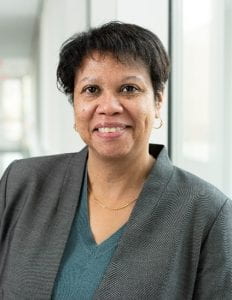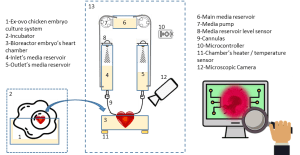2023 Project: “Heart to Heart” – Enabling the Study of Cardiac Morphogenesis
Lead Faculty: Shivaun Archer and Newton de Faria
Department: Nancy E. and Peter Meinig School of Biomedical Engineering
Project Description
Studies in chick models have made significant contributions to our understanding of embryo development, including cardiac development. Advantages of using the chick embryo for research include short development times, no maternal sacrifice, and they can be cultured outside the egg which allows for easy observations. The chick embryo is an excellent animal model in which to study how the heart develops and to provide insight in heart disease and congenital effects, since the four-chambered chick hearts develop in a manner that mirrors human heart development. These hearts can be cultured out of the egg in bioreactors. The bioreactor simulates the natural physiological conditions of temperature, pressures, fluid exchange, and shear stresses, and is a useful research tool to maintain the heart function as studies are performed on the heart.
The 2023 CURIE scholars will design a small bioreactor with fluidic controls to maintain the survival and function of a chick heart ex-ovo. The activities during the week will provide students the opportunity to learn and apply principles of sciences and engineering. Including the understanding of cardiac corphogenesis, fluid dynamics, thermal transfer, Computer Aided Design (CAD), Computer Aided Manufacturing (CAM), 3D Printing, laser cutting, data acquisition and control, microcontroller programming, as well as data visualization, and analysis.
The project will be divided into the following sub-projects.
- Ex-Ovo Embryo Culture Team
- Bioreactor Fluidic System
- Bioreactor Data Acquisition and Control System
- Bioreactor System Scaffold and Environmental Control
- System’s Integration
Students will be divided into sub-project teams based on their interests, however, they will all work together to integrate the components into the final project.
About the faculty leads:
 Dr. Shivaun Archer
Dr. Shivaun Archer
Dr. Shivaun Archer is the John and Janet Swanson Senior Lecturer in the Meinig School of Biomedical Engineering and a Faculty Teaching Fellow in the James McCormick Family Teaching Excellence Institute (MTEI). She received her BS and M.Eng. from Cambridge University, England and her Ph.D. in Chemical Engineering from the University of California, Davis. Dr. Archer designs and teaches lab courses covering nanobiotechnology, cellular, molecular, and tissue engineering, as well as physiology. The labs are designed to illustrate the course material and bring research to undergraduate education whilst exposing students to cutting edge technology and research methodology. In recognition of her efforts in undergraduate education, Dr. Archer has received two prestigious College of Engineering Teaching awards. She has also been a recipient of the Zellman Warhaft Commitment to Diversity Award as well the Academic Achievement Award from the Cornell Engineering Alumni Association. Dr Archer was inducted as a fellow of the American Institute for Medical and Biological Engineering (AIMBE) for her contributions to instructional labs.
Before coming to Cornell, she worked at a small research company specializing in biotechnology, biomaterials, chemical and biological sensors, medical biotechnology, and environmental remediation. Her research interests include nanobiotechnology and tissue engineering.
 Dr. Newton de Faria
Dr. Newton de Faria
“Equipping engineers and scientists with knowledge and tools to accelerate productivity, innovation, and discovery in the field of healthcare”. Although an adaptation of National Instrument’s (NI) mission, it defines de Faria’s career pathways in Academia and in Industry. Under many different roles, he has made significant contributions towards advancements in professional graduate education as well as in the progress of research, development, and deploying of innovative medical technologies in the pharmaceutical, biologics, and medical devices industries.
Since assuming his role as Professor of Practice and MEng Director at Cornell BME, he has been responsible for devising and implementing a first-class and innovative program. He developed a well-balanced and well-tuned needs-based curriculum, created and delivered new courses, and architected and managed the necessary human and physical resources capable of emulating industry within an academic environment. These infrastructures and processes, provide an exceptional real-life and hands-on experiential learning opportunity for the students.
Newton de Faria advocates that “innovation driven culture” is changing the healthcare industry landscape and as consequence, transforming the education requirements and the role of biomedical engineers. He has implemented a teaching philosophy for post-undergraduate education, that addresses these challenges and is capable of enabling a diverse group of students to acquire business and professional acumen, deeper and/or broader graduate level STEM knowledge, and theoretical and practical experiences in relation to the product life cycle of bio-medical technologies.
While at NI, he held many different positions, varying from individual contributor to management. Most of his impact in Biomedical Engineering happened as strategic business development manager for medical devices and life sciences segment. He was responsible for the identification, assessment, planning, and engagement of potential applications in the global healthcare market.

